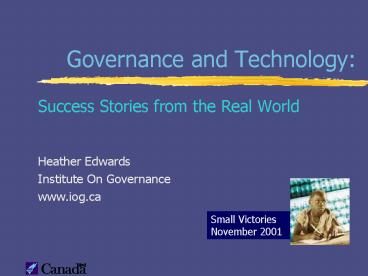Governance and Technology: - PowerPoint PPT Presentation
1 / 27
Title:
Governance and Technology:
Description:
Burkina Faso. Communication: key to building strong communities. ICT role in mobilisation of civil society and representatives. Institute On Governance ... – PowerPoint PPT presentation
Number of Views:54
Avg rating:3.0/5.0
Title: Governance and Technology:
1
Governance and Technology
- Success Stories from the Real World
- Heather Edwards
- Institute On Governance
- www.iog.ca
2
Outline
- good governance
- examples of ICT impact
- resulting hypotheses
3
Democracy Good Governance
- community building
- corruption busting
- freedom of information
- exercising a political voice
- input on the political agenda
4
Democracy Good Governance
- Respect for human rights and basic freedoms
- transparency
- rule of law
- lack of corruption
- accountability
- social equity
- effective representation
- respect for under represented groups
- independent judiciary
- independent and responsible media
- merit based public service
5
Community building
6
Burkina Faso
- Communication key to building strong communities
- ICT role in mobilisation of civil society and
representatives
7
Tanzania
- Tanzania Media Womens Association
- using ICTs to create and distribute information
8
Greenpeace
9
NDI in Namibia
10
Working against corruption
11
India
12
Transparency International
13
Phillipines
- Citizens using ICTs to speak directly with
senators
14
Freedom of information
15
Indonesia
- Using ICTs to circumvent censorship
- inability to control the media
16
(No Transcript)
17
Provision of judicial information
18
Political voice choice
19
France
20
United Kingdom
21
Protest.net
22
Serbia
- Tool for mobilisation of general uprising
- Power of internet, even when only a minority can
access it
23
Government reaction
Participation in Liberal Democracies
ICTs
Telephone Fax, Letter
Social Groups
Citizen
Parliament
Citizens voice political opinions and
interests. Citizens ask about political
information.
Receives, processes and communicates information
in a selective way.
Mass Media
24
OECD Trends
- Information
- scope, quantity and quality has increased greatly
- now a shared objective for all OECD Members
- Consultation
- on the rise but at a slower rate
- large differences remain between OECD Members
- Active participation
- efforts to engage citizens in policy-making are
rare - examples confined to a only a very few countries
25
Resulting hypotheses
26
Democracy Good Governance
- Respect for human rights and basic freedoms
- transparency
- rule of law
- lack of corruption
- accountability
- social equity
- effective representation
- respect for under represented groups
- independent judiciary
- independent and responsible media
- merit based public service
27
Citizens use ICTs when...
- ICTs are part of normal citizen participation
- Available means of participation are perceived as
ineffective - technology is available
28
Constructive use of ICTs
- Create and institutionalise space for citizens to
make positive use of ICTs
29
(No Transcript)































